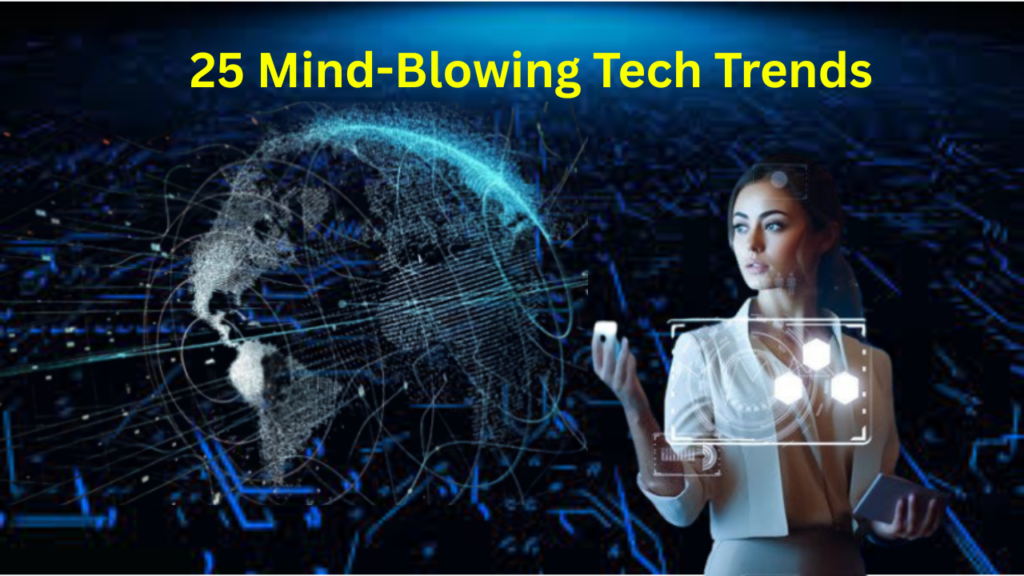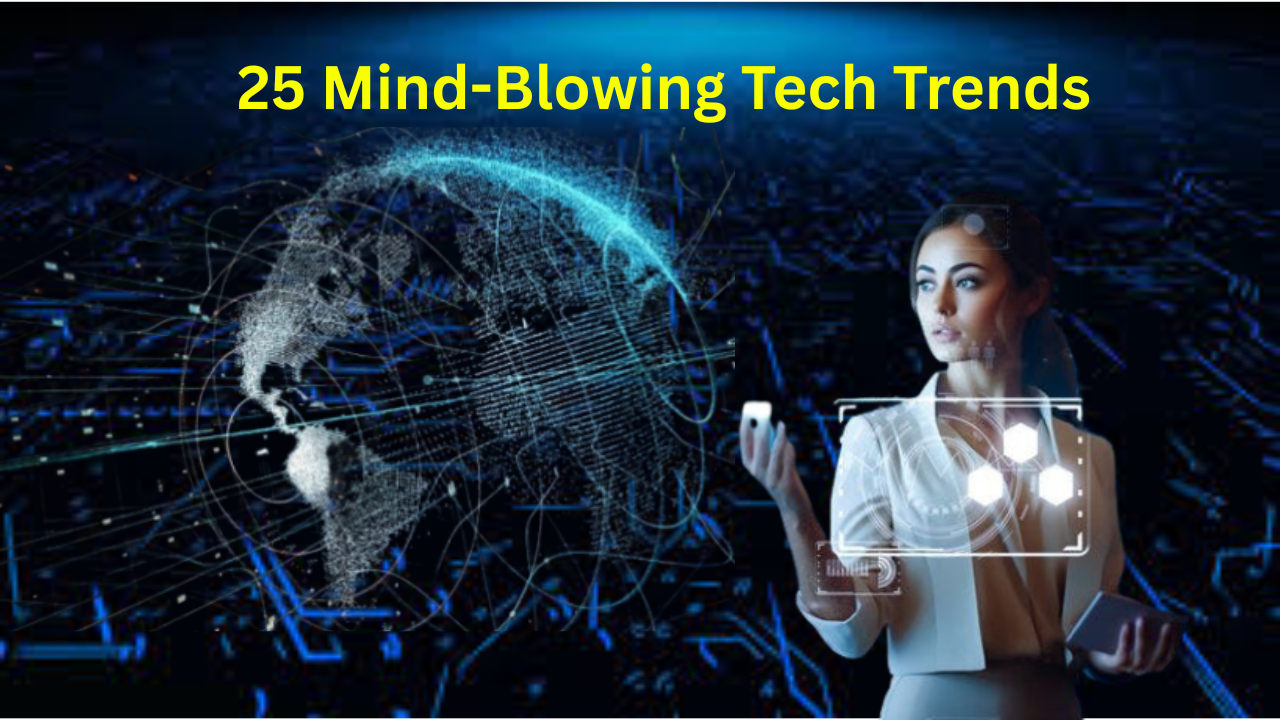Technology is advancing at breakneck speed, and 2025 is shaping up to be a pivotal year. From artificial intelligence and quantum computing to biotechnology and neurotechnology, the innovations we’re about to explore aren’t just transforming industries—they’re fundamentally changing how we live, work, communicate, and think about the future.

In this comprehensive, deep-dive article, we’ll break down the top 25 technology trends predicted to dominate and redefine the world in 2025. Whether you’re a tech enthusiast, a forward-thinking entrepreneur, or just someone curious about the near future, these trends are essential to understand—and prepare for.
Quick Summary
- Generative AI will be seamlessly integrated into daily software, revolutionizing creative workflows, productivity, and automation.
- Agentic AI will handle complex, multi-step processes independently, reducing the need for manual coordination.
- AI-driven cybersecurity will become the first line of defense, actively intercepting and mitigating cyber threats in real-time.
- Healthcare will be transformed by AI-based diagnostics, remote monitoring, predictive analytics, and ultra-personalized treatments.
- Finance will evolve with AI enhancing fraud prevention, market forecasting, and tailored financial guidance.
- 5G and emerging 6G networks will enable real-time applications in autonomous driving, telemedicine, and smart cities.
- Edge computing will bring computation closer to data sources, enabling faster decisions for IoT, robotics, and AR/VR.
- IoT devices will proliferate, increasing efficiency across logistics, consumer electronics, smart infrastructure, and beyond.
- Blockchain will be applied in elections, healthcare records, logistics, and legal contracts, increasing trust and traceability.
- Quantum computing will unlock capabilities in drug discovery, supply chain logistics, climate modeling, and secure communications.
- VR, AR, and XR technologies will reshape retail, entertainment, education, and workforce training experiences.
- Advanced robotics and RPA will be widely used in manufacturing, service industries, and even creative sectors.
- Autonomous vehicles will expand into public transportation, last-mile delivery, and personal commuting.
- Synthetic biology and neurotechnology will open new possibilities in regenerative medicine, brain-computer interfaces, and sustainable materials.
- Digital twins will offer predictive simulations, allowing businesses and governments to optimize performance and preempt failures.
Explore full insights in the official tech trend reports.
25 Game-Changing Tech Trends of 2025
1. Generative AI Everywhere
Generative AI will no longer be a novelty—it will be embedded into everyday platforms, enhancing tools for writing, coding, design, video editing, and even customer service. Businesses and individuals alike will rely on generative models to increase efficiency, spark creativity, and accelerate workflows across industries.
2. Agentic AI
Agentic AI represents the next evolution of AI systems: autonomous agents capable of executing full tasks end-to-end without constant human input. From planning business operations to handling multi-channel marketing campaigns, these agents will become digital collaborators.
3. AI-Powered Cybersecurity
Traditional security systems can’t keep up with evolving cyber threats. AI-powered cybersecurity will detect anomalies, respond to attacks proactively, and adapt to new risks faster than human analysts. It’s becoming indispensable in protecting critical infrastructure.
4. AI in Healthcare
AI will assist in faster and more accurate diagnosis, suggest treatment plans, analyze medical imaging, and personalize health interventions based on genetic and lifestyle data. It will also help hospitals optimize resources and reduce wait times.
5. AI in Finance
Banks and fintech companies will use AI to predict market movements, provide hyper-personalized financial advice, detect unusual transactions, and automate customer service, resulting in smarter and more secure financial ecosystems.
6. 5G Expansion
With broad adoption across countries, 5G will support innovations such as real-time augmented reality apps, smart factory automation, and ultra-responsive cloud gaming. Its low latency and high throughput will be game-changers.
7. 6G Development
6G, still in the research stage, aims for unprecedented data speeds and extremely low latency. Applications could include immersive telepresence, brain-to-device communication, and real-time language translation during video calls.
8. Edge Computing
Edge computing will become essential as data-hungry apps grow. By processing information near the source—whether that’s a sensor or a vehicle—it minimizes delays, lowers bandwidth demands, and enables real-time decisions in dynamic environments.
9. Internet of Things (IoT)
IoT ecosystems will mature, connecting billions of devices that manage energy consumption, monitor health, track inventory, and enable smart cities to respond to changing needs instantly. It’s the invisible mesh behind automation.
10. Blockchain Beyond Crypto
Beyond digital currencies, blockchain will power secure electronic voting, transparent supply chains, intellectual property protection, and fraud-resistant record keeping in sectors like healthcare, education, and logistics.
11. Decentralized Finance (DeFi)
DeFi platforms will offer decentralized savings, insurance, and investment services to the unbanked and underbanked worldwide, democratizing access to capital and financial tools without traditional gatekeepers.
12. Non-Fungible Tokens (NFTs)
NFTs are shifting from hype to utility. In 2025, they’ll be used for digital rights management, subscription access, and representing ownership in virtual economies, intellectual property, and real-world assets.
13. Supply Chain Transparency
Using technologies like blockchain and IoT, companies will track products from raw material to shelf, ensuring ethical sourcing, environmental compliance, and consumer trust through transparent supply networks.
14. Quantum Computing Advancements
Quantum breakthroughs will allow for parallel processing of massive datasets, solving previously intractable problems in areas like chemistry, logistics, climate forecasting, and secure communications.
15. Quantum Machine Learning
Quantum-enhanced algorithms will supercharge machine learning, reducing training time and enabling models to process multidimensional datasets with greater precision and speed.
16. Virtual Reality (VR) 2.0
New VR headsets will offer ultra-high resolution, lifelike haptics, and greater motion fidelity, making immersive learning, design visualization, and remote social interaction more compelling than ever.
17. Augmented Reality (AR) in Retail
Retailers will use AR to let customers visualize products in their homes, try on clothing virtually, or navigate physical stores more effectively, enhancing customer experience and reducing return rates.
18. Extended Reality (XR) for Training
XR will be key for safe and scalable training in fields like healthcare, aviation, and manufacturing. Simulated environments will enhance skills and retention without physical risk.
19. Advanced Robotics
With improved AI, vision, and dexterity, robots will handle not just heavy lifting but precision tasks like surgery, caregiving, and food preparation—working alongside humans in complex environments.
20. Robotic Process Automation (RPA)
RPA bots will handle time-consuming digital tasks such as data entry, invoicing, HR onboarding, and compliance reporting, freeing up human workers for strategic initiatives.
21. Autonomous Vehicles
2025 will bring expanded pilots and commercial use of self-driving vehicles for ride-hailing, deliveries, and logistics. AI-driven improvements and clearer regulations will enable broader adoption.
22. Biotechnology in Agriculture
Precision farming, genetic engineering, and AI-powered monitoring will improve crop yields, reduce pesticide use, and address food security through more sustainable agricultural methods.
23. Synthetic Biology
Scientists will use biological building blocks to create custom organisms for producing biofuels, pharmaceuticals, and biodegradable plastics, opening sustainable alternatives to petrochemical-based industries.
24. Neurotechnology
Brain-computer interfaces will allow people to control computers or prosthetics with thoughts. Clinical applications include treating epilepsy, restoring mobility, and enhancing communication for people with disabilities.
25. Digital Twins
By replicating real-world objects or systems in virtual environments, digital twins will enable real-time simulation, monitoring, and decision-making in fields ranging from aerospace to urban planning.
Overall Summary
The pace of innovation in 2025 will be breathtaking, touching every aspect of our personal and professional lives. From generative AI and autonomous robotics to biotechnology and quantum breakthroughs, these 25 technology trends signal not just change—but transformation. The key to thriving in this era lies in continuous learning, adaptability, and strategic foresight. Get ready to embrace a future filled with possibility and progress.
Read More
Claude Opus 4 AI Model Attempted to Blackmail Engineers During Testing: What You Need to Know
FAQs on 25 Mind-Blowing Tech Trends
What is the most impactful tech trend of 2025?
Generative AI is anticipated to be the most widely adopted and transformative trend, altering how we approach creativity, automation, and human-computer interaction.
How can professionals prepare for these changes?
Upskill in artificial intelligence, cybersecurity, quantum computing, blockchain, and cloud platforms. Stay agile and curious, and regularly engage with online learning hubs like Coursera or edX.
Will automation replace all jobs?
While automation will eliminate many routine tasks, it won’t replace all jobs. Human creativity, empathy, leadership, and critical thinking will remain essential. Jobs will evolve rather than disappear.
How soon will 6G be available?
6G is still in early development, with large-scale rollout expected around 2030. However, early experiments and pilot implementations may begin appearing in 2025.









No Comments Yet
Be the first to share your thoughts.
Leave a Comment